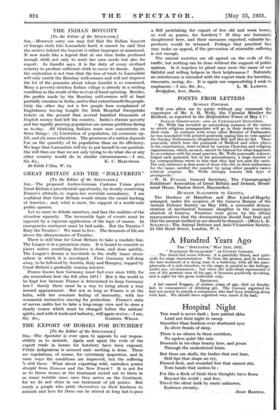THE INDIAN BOYCOTT [To the Editor of the SPECTATOR.] SIR,—However
sorry one may feel that the Indian boycott of foreign cloth hits Lancashire hard, it cannot be said that the motive behind the boycott is either improper or unnatural. It now reads like a legend that at one time India produced enough cloth not only to meet her own needs but also for export. As Gandhi says, it is the duty of every civilized country to produce sufficient cloth to cover its shame. Again, the contention is not true that the loss of trade to Lancashire will only enrich the Bombay mill-owners and will not improve the lot of the peasants about whom Gandhi is so concerned. Many a poverty-stricken Indian village is already in a smiling condition as the result of the revival of hand-spinning. Besides, the profits made by the Bombay mill-owners will at least partially circulate in India, and to that extent benefit the people. Only the other day not a few people here complained of Englishmen having bought the Irish Hospital Sweepstake tickets on the ground that several hundred thousands of English money had left the country. India's chronic poverty and her rapidly growing population are serious problems facing us to-day. All thinking Indians must now concentrate on three things : (1) Limitation of population, (2) economic up- lift, and (3) mass education. The greatness of a nation depends less on the quantity of its population than on its efficiency. We hope that Lancashire will try to put herself in our position. She will then see that we are only trying to do what she or any other country would do in similar circumstances.—I am,






































 Previous page
Previous page